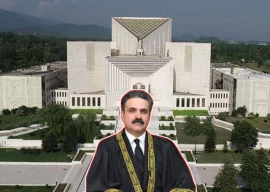
The succession of a party which claims to have ‘restored democracy’ to Pakistan was through a handwritten letter, apparently bequeathing the political party to her widower, Asif Ali Zardari, as co-chairman, with her adolescent son. Some commentators were suspicious about the veracity of the letter and did not agree with the choice of successor. Many party insiders had then reported that Ms Bhutto had vowed to quarantine her third government from Zardari’s influence.
If so, then the current complexion of the PPP could not be further from what Benazir Bhutto had envisioned for a future PPP government. Most of her closest confidantes have been sidelined, even victimised. Naheed Khan, Safdar Abbassi and Amin Fahim sat beside Bhutto on that fateful journey, surviving the bomb blast unscathed, yet ironically falling victim to humiliation and machinations within the party. Prominent figures like Raza Rabbani, Aitzaz Ahsan, Sherry Rehman and Shah Mahmood Qureshi are no longer in key positions. They, and others like them, have either resigned or been relegated.
Raza Rabbani, whose intellect, conscientiousness and commitment to his principles are widely respected, resigned from his ministerial post in May this year citing differences over compromises made on the 18th Amendment to accommodate the PML-Q. Sherry Rehman resigned over her government’s harsh treatment of the media, sections of which are engaged in a bitter confrontation with the presidency. Aitzaz Ahsan has been sidelined, his influence on party policy rendered negligible.
Shah Mehmood Qureshi, who was handling a difficult portfolio with considerable finesse, was shunted out of the foreign ministry for taking a stand against the government’s management of the Raymond Davis case. Qureshi’s crucial post lay vacant for six months only to be filled by a foreign policy debutante. Hina Khar, aged 34, is a graduate in hotel management and a former minister of state for economic affairs (later foreign affairs), inducted by Shaukat Aziz. Khar has been on many official foreign visits since she entered politics in 2002 to take on her father’s feudal constituency. Those trips and a hasty six-month initiation as the state foreign minister represent the sum total of her interaction with international diplomacy and statecraft. Her lack of experience and professional credentials will be stark against counterparts with the profiles of like Hillary Clinton.
The fact that someone with such a junior standing was chosen for such a key post over party veterans is reflective of a calculated policy. Those with substantial intellectual or political weight have been systematically removed or their positions made untenable, altering the complexion of the party’s upper echelons. The PPP’s vanguard, like Benazir Bhutto herself, used to be highly educated, urbane and liberal, despite their feudal backgrounds. The path to success in the current PPP is instead dominated by those whose intellect is modest, whose principles are malleable, and whose ethos is confrontational. Instead of the Raza Rabbanis, Shah Mehmoods and Aitzaz Ahsans, the ascendancy has been for the likes of Rehman Malik, whose incompetence is astounding, and Zulfiqar Mirza, whose opinions and behaviour have the potential to be incendiary. Many people in the party in senior posts have, at various times, employed profanity, invective and inflammatory rhetoric against the leaders of the PML-Q, PML-N and the MQM.
This politics of aggression and confrontation is a betrayal of Benazir Bhutto’s legacy. Bhutto’s final book, published posthumously, reflected her deep desire to foster a new era of democracy in Pakistan and the Muslim world, with values of respect, understanding and reconciliation. Most of what Benazir Bhutto stood for and hoped for has been buried with her. The rallying cry of the party rings desperately hollow.
Published in The Express Tribune, July 23rd, 2011.
COMMENTS (52)
Comments are moderated and generally will be posted if they are on-topic and not abusive.
For more information, please see our Comments FAQ







1730379446-0/WhatsApp-Image-2024-10-31-at-17-56-13-(1)1730379446-0-270x192.webp)
1724926799-0/Untitled-design-(7)1724926799-0-270x192.webp)








Re: Meekal Ahmed
While the chastened art of public speaking is always an asset for a public office holder but Pakistan’s economy needs improvements in competitiveness, economic governance, curtailment of moral hazard and a host of well planned macroeconomic interventions which, I suspect, might have a weak correlation with a state minister’s speechmaking ability.
If you look at the performance of our past economic managers of 50 years, you will quickly come to the painful conclusion that it has been pretty much the same with pre-scripted budget rotated over 50 years.
The need for portraying a soft image of Pakistan in the post 9/11 environment cannot be overemphasized for which, I believe, Ms. Khar can be very effective.
@Shania: If these are propogandas than wait till you actually can see the writing on the wall, as that may be even more depressing and unpleasant reading!!! Do note that time does not stop for anyone, hence hope your nation can do do U turn in time, otherwise you may just wonder what happened to it!!!! The sad fact is that, The nation may not even exist in near future in its present form !!!
@Hedgefunder: Your hysterical railings against Pakistan belie your roots. So why not come clean or are you too ashamed? You ought to be, given the incessant negativism that permeates all your comments. I have met many Indians- some of whom are my good friends- but have yet to come across somebody who is so blatantly anti-Pakistan.
At the end of the day, if you keep making biased comments, nobody will take you seriously- irrespective of how many exclamation marks you attach to the end of your sentence. All I can say is, thank goodness people like you represent a small minority, or there would never be any hope of better relations between Pakistan and India.
Great analysis - at least someone can write so well while being balanced and analytical instead of the emotional self promotion of some writers
@Maverick: Well done - am sick of indians posing under fake names to plant their hateful propaganda.
The slogans are just to make emotional blackmail. PPP has no sympathy for the poor people who vote for it. Sind has worst poverty and backwardness in the very areas thise Mirza and Zardari come from. It is sickening that they use these poor peopel for their own greed.
Brilliant piece - keep on writing to expose these feudal lords in democrats clothing.
Excellent article and very bold too.
The party is over - ideologically at least - it is a ghoonda party now.
Pakistanis may understand this dynamic! "The Greek political system has failed tragically because, since the re-establishment of parliamentary democracy in 1974 after seven brutal years of military rule, elected officials from the two main political parties have governed via clientelist practices and undemocratic principles. Political leaders took turns locking voters into a long-term relationship based not on the delivery of public goods and a just social order, but on promises of targeted resource redistribution to party faithful. Political leaders saw the state not as an instrument for carrying out just and effective social and economic policies, but, instead, as a tool for realizing party-based goals, clientelist relations, and purely personal interests. This undemocratic and corrosive political process helps to explain, in large part, why the Greek public administration system is so inefficient and notoriously corrupt, but it also sheds light on why the nation as a whole seems to lack a culture of public attitudes and projects built around common interests and civic life. "http://www.truth-out.org/greeces-crisis-long-making/1311101734
It's quite sad and ridiculous that Pakistani's jump to say things like this is obviously your "indian origin " speaking- totally irrelevant to the matter at hand and a low blow. Something the world expects from us. Hedgefunder is absolutely right- there is nothing positive in the article, and thanks to zardari and his posse, theres not much positive left in this country either.
Excellent Article! Well done.
While the Author is entitled to her views, PPP's success or the lack of it must be seen in the context of BB's 'deep desire to foster a new era of democracy in Pakistan and the Muslim world, with values of respect, understanding and reconciliation'.
A. A new era in democracy has certainly dawned in Pakistan with the 18th Amendment. In the rest of the Muslim world too there is a new awakening. If Pakistan is somehow seen on the other side of the Arab spring in Bahrain, PPP is not to be blamed.
B. PPP has also shown a great deal of respect and understanding towards all political forces. Allies and opponents alike. The very fact that the establishment is finding it difficult to get a willing hand maiden to deliver a change in presidency, is ample proof of the same.
C. In so far as missing out on the 'valuable' services of politicians of 'stature' such as Mr Qureishi, the ex-minister of Foreign Affairs is concerned, a closer examination will reveal that it is not such a disaster after all. Mr Qureishi violated the basic tenet of 'collective responsibility' applicable to Parliamentary Democracy. He put himself in a certain position at the behest of certain forces during the Davis affair and the same forces then went behind his back and cut a deal with the CIA. Again, hardly something the PPP can be blamed for.
D. Bottomline is, If the PPP manages to finish its full term and ensures that the next government is ushered in through the ballot and not the bullet, their achievement would be unprecedented in 65 years of Pakistan's existence.
And that, Madam, is reason enough for me to have a rollicking party. You are invited.
@Maverick: Firstly don't patronise me with your opinions in regards to my origin!! The fact is i was not even born in the country concerned !! I don't have to hide behind anything or anyone !! The fact is that i have no duel nationality, nor an Vote as citizen in India, but do have that right in UK. I also need to obtain Visas to visit the Country !!! Now enlighten me as to your relevance to this article and the Comment made by me??? Bit lost are we??? Stick to the article in question, don't divert away from issues with your India Phobia !!!!
Really good analysis. I think in any political party the leader influences the parties ethos and moulds it according to his/her capacity. That is why we see the change from Sr. Bhutto to Mr. Zardari, its an evolutionary process and when not handled well results in what you have described.
@Adnan: Is there anything positive in this article, that suggests that one should be positive?? Yes perhaps, you want me to congratulate your elected politicians as to their conduct while in office!! Or perhaps when they issue senior positions in the Govt to people who are well out of their depth !!! Ok that's being positive !!!!! What is there in today's Pakistan, which one can feel positive about??? The very word is related to all the words one really does not want to hear or mention!! Try it on google or any other search engines and see the related topics !!!
@Adeel. The President's popularity has plummeted. You are behind the news. It is ironic that Musharraf's popularity lasted longer! Doesn't say much for a democratic party. Popularity is down to 11% in 2011. One must keep up with the news! http://www.thenews.com.pk/TodaysPrintDetail.aspx?ID=6942&Cat=13 Zardari’s popularity down to 11pc: Pew poll 76 percent support media; Imran liked by 68 percent. @Masood Raza PPP is not an ideology, it is a slogan. When you have an ideologiy you actually practice it. Look at what Workers Party has delivered in Brazil and how PPP has failed, no matter who leads party. @tanam Mr. Bhutto was a civilian dictator. Please read the book written by Sherbaz Mazari "Journey to Disillusionment." I assume PPP supporters are now part of 11% of Pakistan!
@Hedgefunder: Do you ever have anything positive to say?
@Raza: She ran the Finance Ministry for the last 8 years?!
Sir, you need to really stop taking those pills.
Mere taking PPP a political party is totally wrong PPP is an ideology, a vision and a thought, Indeed Shaheed Zulfiqar Ali Bhutto and Mohtarma Benazir Bhutto Shaheed were the founder of very basis of this party, but after them deeming that party is over, is absurd. Ideology can not be defeated, can not be destroyed and can not be scratched out. The leaders like Naheed Khan, Safdar Abbasi and Shah Mehmood Qureshi, violated the party’s code of conduct and no party, whether it is MQM, ANP, PML-N or JI, does not tolerate breach of party laws, furthermore, after martyrdom of Mohtarma Shaheed, a PPP leaders, PPP given identity and name, deem that if they were national leaders and PPP can not run without their prior assistance. Infacct they forgot what happened to Leghari, Khar and Mumtaz Bhutto after they bid goodbye to party, they swayed their tail before leaders of all the political parties and even dictators but in vain, today even you can not find their names in political wizard of Pakistan. Don’t forget PPP is still a hope and will always be a hope for the browbeaten people of Pakistan for it is the party of peasants, workers and downtrodden people of Pakistan. PPP is not an NGO it is the party having roots in all the provinces of Pakistan. You can root out something that is on earth but can not unearth and ideology that is buried in the hearts of people. PPP is an ideology. I don’t know Mr. Meekal Ahmed what sort of hatred you have in your mind against BB Shaheed, a matchless and a legendary leader. Could you answer me please, who could materialize the dreams of BB Shaheed or Z.A Bhutto except their heirs. You are welcome if you could understand the vision of BB or Z.A Bhutto Shaheed. BB herself nominated Asif Zardari for she knows he is the only man that could withstand with the vision and philosophy of Bhuttos.
Sorry but none of them have been intellectuals that have made much difference in the lives of ordinary Pakistanis. In fact every PPP term, including ZAB's has led Pakistan further down the tubes. Today we do not stand far off from Zimbabwe or other African countries. This is the result of the democratic experiment in Pakistan.
why not a foriegn minister some body graduated from karachi university or punjab uni or could be from allama iqbal uni but not from a fuedal background is not better for pak.
Ok PPP critical stage yet to come because at present it enjoys the ruling but when its leaders left the government then their real test would be started. Lets wait and see. The Party is not yet over but near to the brink.
When was the last time we had a Cabinet and an Assembly (federal and provincial) that was not embarassing?
The article is totally inaccurate Hina Khar is not a graduate in hotel Management. She graduated from LUMS, and did her Masters from a top school in USA.
She virtually ran the finance ministry for the last 8 years.
You should check your facts..
@Adeel: You forget the present day my brother, NADRA just declared and removed thirty seven million votes from the electoral rolls as BOGUS. The post-election scenario existing today is different from February 2008 and the electorate will base their votes on 'who' has done what for the people. But the benefit of the doubt rests with you for the simple reason of 'manipulation.' Salams.
Courageously written. This article is a watershed of the 'agreeables' and the 'disagreeables.' Please accept my Salams.
Each word of it was True. Bhutto all the way \m/
As I have said before, if the champions of diplomacy in the past were so great why are we in such a royal mess?
We saw many of the Oxbridge ilk who masqueraded as great diplomatic craftsmen but turned out to be completely clueless about what our foreign office ought to have been doing. They maintained status quo, preserved the archaic system and failed miserably!
The comments doing the rounds against Ms. Khar are astounding, if not disengenuous. She has been in office barely a week and the commentators, many of whom are perhaps captivated by a heightened sense of jealousy, have rushed to judgment declaring her a misfit either because of her age, feudal background or her master's degree.
And by the way, most of our foreign missions work with the efficiency of a wounded animal, they are often ill informed, uninspiring and thus add greatly to the cost of doing business with Pakistan. Little wonder that with great consistency their contribution to trade or commerce has been negligible.
The FO has historically had very weak linkages with the local chambers of commerce and almost none with foreign trade bodies, an area where Ms. Khar would be well advised to channel her time and resources.
Well people pf pakistan voted for zardari. he had an approval rating of 67% when he assumed office...and there are all the signs that PPP will be elected in the next elections as well...Long Live Democracy, Pakistan Style!
Its just a propaganda against party of the people which this fascist rightist media can not comprehend.
The author might want to consider that President Zardari is different from his deceased wife. Maybe he didn't feel comfortable around people she felt comfortable with? They were an odd pair from the beginning;and the new party direction appears to reflect that.
Excellent, excellent analysis! Well done Mahreen!
very good in depth analysis.
You Wish. Jiye Bhutto !
disagree wid writer she almost written the propaganda by media
True to the core. Bhutto's ideology has been misused by this PPP.
Very well articulated. Though the party of the old days may be over, the new faces will continue to rule over this ethnically divided nation just like before. They know exactly how to use emotionalism, the brand of Bhutto, and the backwardness of this society to strengthen their following. Violence and the the politics of aggression that we have seen lately are merely techniques to play with the minds of the jiyalas and their political workers.
Could not have been said in a better manner.!
In politics: Loyal pygmies are better than tall recalcitrants.
Sudden death of BB resulted in Zardari becoming President. He had no power base. But rode the name of his wife to the highest office. Once there, to secure himself from the BB loyalists who would never let him be his own man, he did what anyone in power does - get your own people in and around you. I am not condoning his actions. But merely stating the immutable law of power. Now why he tolerates the ever colourful Rehman Malik and the fractious Mirza is beyond me. But nothing is forever....
Very well written Ma'am, Well i recall i mentioned on various occasions as to Ms Khar's credentials in regards to her Office and sadly ET in their wisdom decided not to publish the very fact, that you have raised ! Pakistan is in for very rough ride ahead and it really needs a seasoned diplomat to handle the world, not some Novice with Hospitality Degree in charge as Foreign Minister, No doubt that the Policy will be made by GHQ, however it takes skills to present it !!! In regards to the current Cabinet, well frankly its an Embarressment, as it seems too many conflicting statements are coming out from various ministers !!!!!
Very well said, Madam, but Bhutto himself dumped all the old party faithful for starters: Khar, Jatoi, Peerzada, JA Rahim, Mumtaz Bhutto and so on and BB's two terms in office did not inspire...shall we say, confidence. No matter which stalwarts were with her (or not), old or new, it did not make much of a difference to the way she governed which was appaling. However, it is true that she was constantly undercut by the military and a hostile President -- not forgetting our own Brutus, Laghari.
As for the present lot, some good people have been side-lined and maybe not so good people brought in. Would they make a difference? Possibly, but a marginal one. Can you see any one of them raising taxes on the rich and eliminating exemptions and concessions on the powerful and well-connected? Do you think they would have brought in the VAT? How about bringing back the wealth tax?
Not on your life.
As for Ms Khar, I share your views. She has many fans here, mostly but not entirely women, but she is a classic non-descript "light-weight" as demonstrated amply in her previous position which was grandly called Minister of State for Economy and Statistics where she did not do anything for either.
well done peeluu.